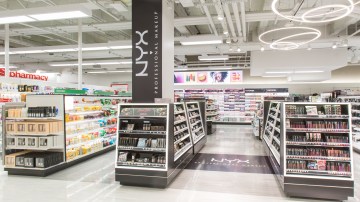Farfetch has had a difficult year. The company went from getting approval on a massive deal to buy Yoox Net-a-Porter from Richemont to canceling its last earnings report at the last minute, struggling with a massive debt load and potentially going private.
Now, the company has been sold. Announced Monday morning, Farfetch has been purchased by the South Korean e-commerce company Coupang. The announcement came as rumors swirled that Farfetch was skirting close to bankruptcy. The combination of spending on major initiatives like the purchase of YNAP just as spending on luxury began to decline across the U.S. put it in a risky situation. In November, the company called off its third-quarter earnings release shortly before it was scheduled, saying it would issue further guidance soon.
Farfetch’s shares have lost 97% of their value over the last five years. By the beginning of December, it was clear Farfetch was in need of emergency funding. That’s now come in the form of $500 million from Coupang to buy a majority stake in the company and take it private. Farfetch has several major backers including LVMH, Richemont and Alibaba, but none of them came to its rescue. Richemont explicitly stated in November that it would not invest any further cash into Farfetch.
Also in November, Richemont confirmed that, in addition to the sale of YNAP to Farfetch being terminated, Richemont will also not use Farfetch’s technology stack to power e-commerce for its brands, which was announced alongside the YNAP deal last year.
Coupang, a large Korean e-commerce marketplace similar in structure to Amazon and Farfetch, is viewing the acquisition as a chance to have a greater foothold in luxury.
“Farfetch will rededicate itself to providing the most elevated experience for the world’s most exclusive brands, while pursuing steady and thoughtful growth as a private company,” said Bom Kim, CEO of Coupang, in a statement. “We also see tremendous opportunities to redefine the customer experience for luxury clients everywhere.”
A number of Farfetch board members have stepped down in the last year, including J. Michael Evans, president of Alibaba Group, who resigned from his role at Farfetch earlier this month. Frederic Court, founder of luxury investment firm Felix Capital and a former board member of Farfetch until he left in 2019, declined to comment on the sale other than to say he was “glad that the business can continue.”
In a statement, Farfetch founder José Neves, who will remain at the company through its acquisition, emphasized that Coupang’s size and scalability are exactly what Farfetch needs.
“Coupang’s proven track record and deep experience in revolutionizing commerce will enable us to deliver exceptional service for our brand and boutique partners, as well as for our millions of customers around the world,” he said.




